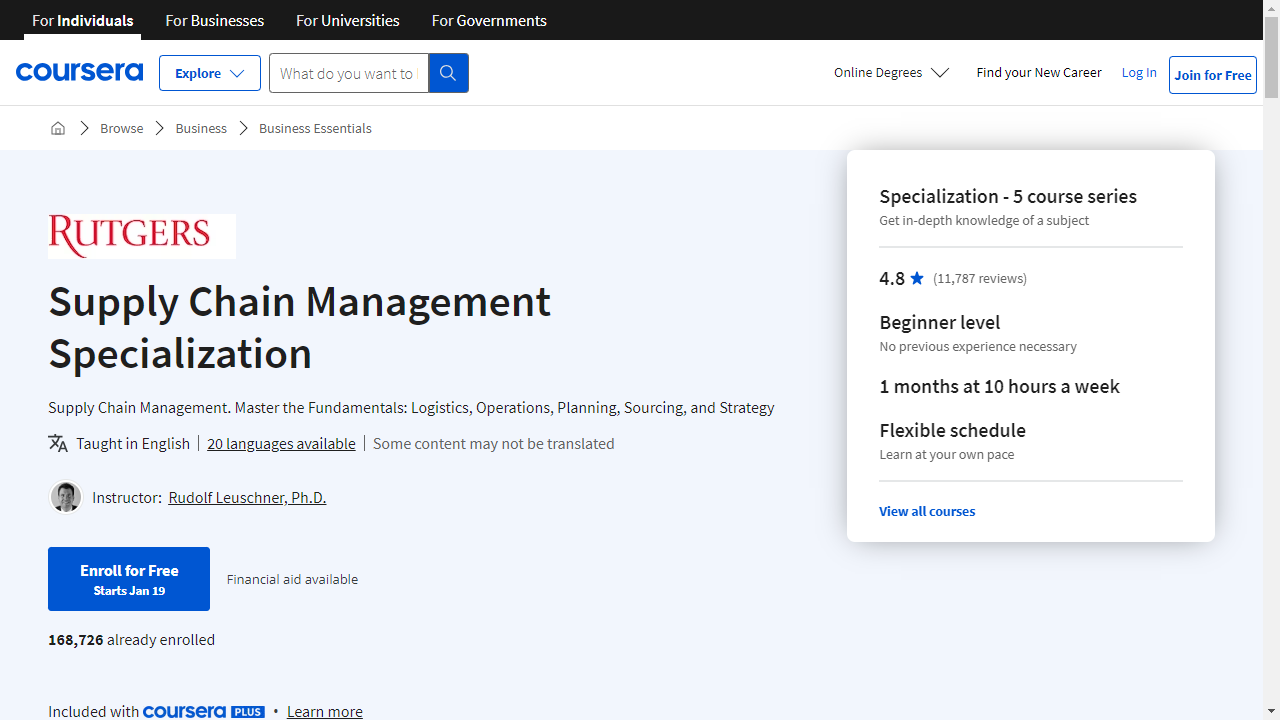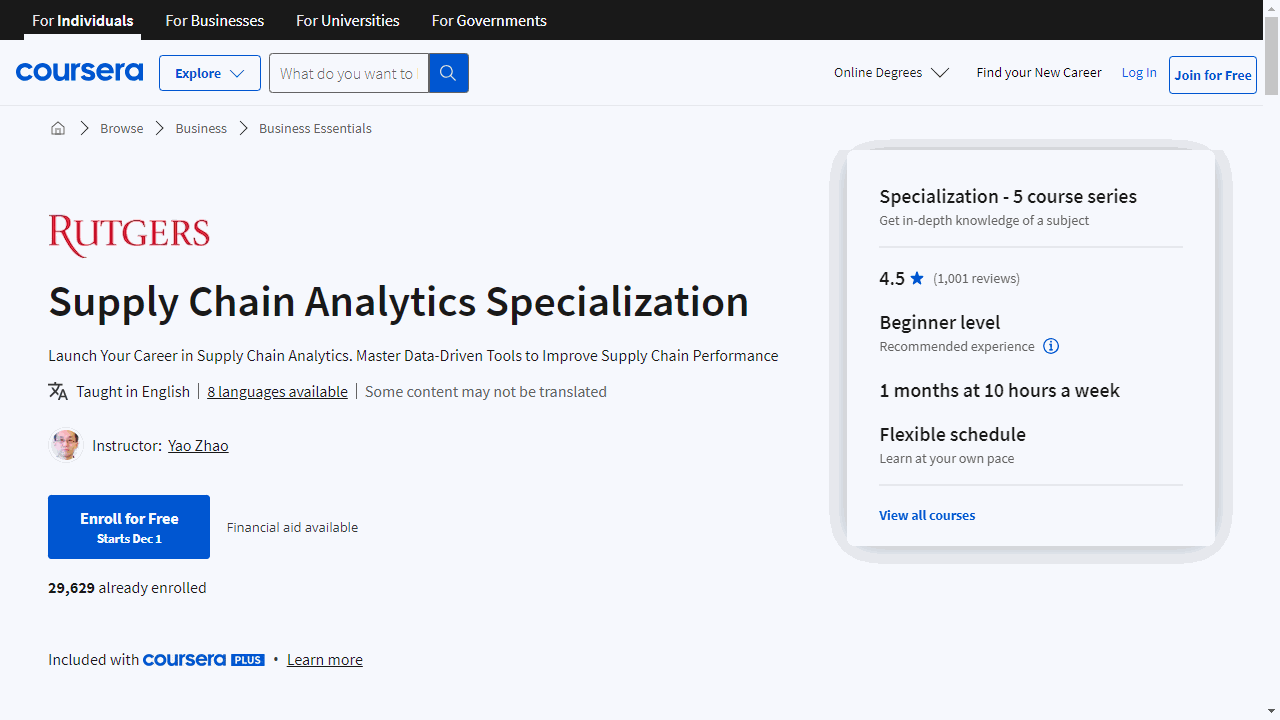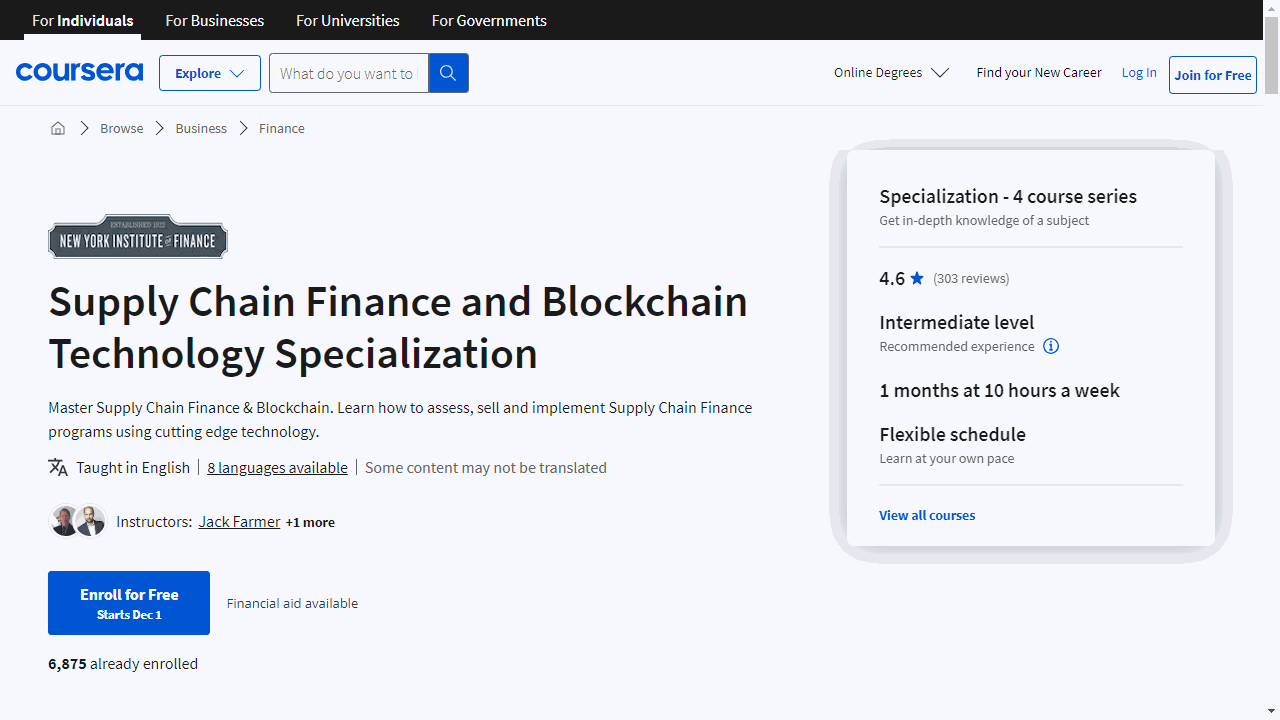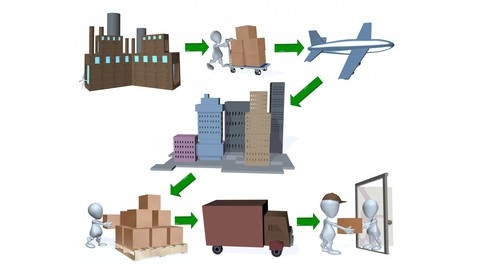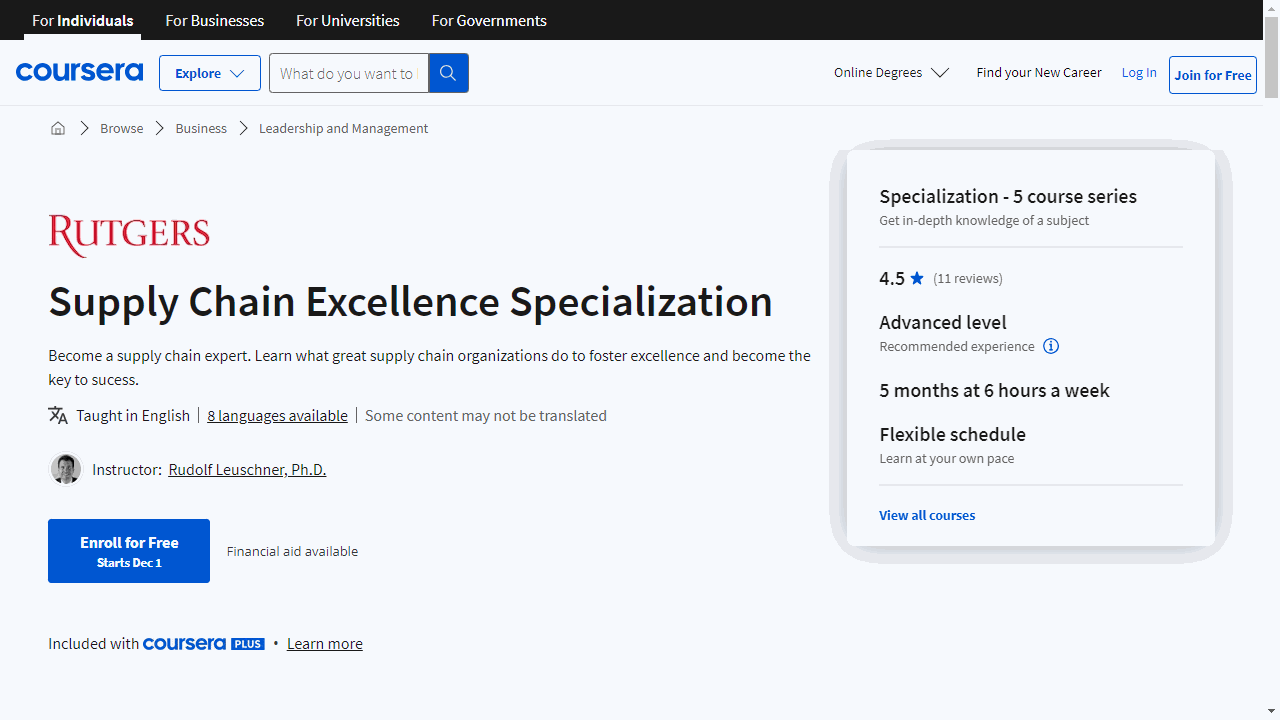Supply chain management is the backbone of modern businesses, encompassing the intricate network of organizations, people, activities, information, and resources involved in moving a product or service from supplier to customer.
By understanding the principles of supply chain management, you can gain valuable insights into optimizing processes, reducing costs, improving efficiency, and ultimately enhancing customer satisfaction.
Whether you’re aspiring to a career in logistics, operations, or procurement, or simply seeking to broaden your business acumen, a solid grasp of supply chain concepts is essential.
Finding a truly comprehensive and impactful supply chain course can be challenging, with numerous options available online, each promising to unlock the secrets of this complex field.
You’re looking for a course that not only covers the theoretical foundations but also provides practical tools and real-world applications to solidify your understanding and prepare you for success in this dynamic field.
Based on our in-depth analysis, we believe the Supply Chain Management Specialization offered on Coursera is the best course overall for mastering supply chain management.
This specialization provides a holistic and in-depth exploration of key supply chain concepts, from logistics and operations to planning and sourcing.
Through a series of engaging courses, you’ll gain a comprehensive understanding of the entire supply chain ecosystem.
However, the ideal course for you may depend on your specific learning goals and preferences.
We’ve compiled a list of other excellent supply chain courses catering to various needs and skill levels.
So, continue reading to discover the perfect course to launch your supply chain management journey!
Supply Chain Management Specialization
Provider: Coursera
The “Supply Chain Management Specialization” on Coursera is a great resource if you’re interested in learning how products move from factories to your doorstep.
This specialization walks you through the core elements of a supply chain, starting with the basics of logistics in the first course, “Supply Chain Logistics.”
You’ll learn about transportation, warehousing, and inventory management, gaining the ability to evaluate different transportation methods, design efficient warehouses, and create cost-effective logistics networks that prioritize customer satisfaction.
The specialization then delves into “Supply Chain Operations,” teaching you how to establish efficient and consistent production processes.
You’ll explore process improvement tools such as Six Sigma and Lean, understanding how to minimize waste and maximize efficiency.
You’ll even have the opportunity to apply these tools to real-life scenarios, improving a process you’re working on.
“Supply Chain Planning” is the focus of the third course, where you’ll learn how businesses predict demand and avoid overproduction or shortages.
You’ll explore the analysis of demand data, different forecasting techniques, and how to select the best method for predicting future demand.
This knowledge will give you the ability to create a robust Sales and Operations Plan.
Next, you’ll explore “Supply Chain Sourcing,” which covers the process of selecting and managing suppliers.
You’ll gain insights into segmenting suppliers effectively and building strong relationships with them, ensuring a consistent flow of materials and products.
The course also covers techniques like Lean Six Sigma, furthering your understanding of supply chain optimization.
Finally, the “Supply Chain Management Strategy” course serves as the capstone, where you’ll apply the knowledge you’ve gained to develop a comprehensive supply chain management strategy for a real-world case study.
This course will solidify your understanding of managing a complex network of companies and ensure efficient and effective supply chain operations.
Supply Chain Fundamentals: Understanding the Basics
Provider: Udemy
This Udemy course on Supply Chain Fundamentals gives you a solid understanding of how supply chains work.
You’ll start with the basics of supply and demand, learning about different demand types and patterns.
You’ll then discover how to forecast demand using various techniques like Simple Moving Average and Exponential Smoothing.
Don’t worry; the course provides practice exercises so you can apply these techniques.
You’ll dive into the world of manufacturing, exploring different environments, product lifecycles, and layouts.
You’ll grasp the importance of Sales & Operations Planning (S&OP), learning how to develop production plans and use tools like Master Production Schedules (MPS).
The course guides you through creating these schedules and understanding essential concepts like Rough Cut Capacity Planning (RCCP) and Available-to-Promise (ATP).
Get ready to master Material Requirements Planning (MRP).
You’ll learn how to create Bills of Material (BOM) and understand the crucial elements of MRP execution, such as offsetting, exploding, and time phasing.
The course also covers capacity planning, ensuring your production plans are efficient and meet demand.
Finally, you’ll explore the often-overlooked areas of production activity control, inventory management, and sustainability.
You’ll learn about managing inventory effectively, understanding carrying costs versus ordering costs, and using the Economic Order Quantity (EOQ) to optimize your inventory.
You’ll also gain insights into the importance of sustainability in supply chain management.
Supply Chain Analytics Specialization
Provider: Coursera
This specialization on Coursera is a great starting point if you are looking to break into the world of supply chain analytics.
You will learn how to use data to make better decisions in every part of the supply chain, from predicting what people will buy to managing inventory.
The courses use real-world examples, like how American Airlines analyzes its competitors and how a cookware manufacturer called AK uses data to predict demand.
You’ll see how these companies use analytics to make smart choices and get ahead.
The specialization also gives you the chance to try out your skills with free online tools.
You’ll even learn how to use a special tool that helps you find jobs in supply chain analytics.
Imagine being able to predict what customers want before they even know it.
You’ll learn how to do that by using data to forecast demand.
You will also discover the secrets of inventory management, figuring out the right amount of stock to keep customers happy without overspending.
Think of it like a puzzle – you need to find the perfect balance, and this specialization will give you the tools to solve it.
Fundamentals of Logistics, Supply Chain & Customer Service
Provider: Udemy
This course gives you a strong base in logistics, supply chains, and customer service.
You start with the basics of logistics, understanding its importance and different types like outbound, inbound, and reverse logistics.
You discover how to make smart decisions about storage, distribution, and inventory management.
You even learn about the bullwhip effect, where small changes in customer demand can cause big problems further down the supply chain.
Next, you dive into supply chain management (SCM) and see how it connects suppliers, manufacturers, distributors, and retailers.
You learn about SCM goals and strategies like push strategies and how to handle unexpected problems.
You’ll also discover the ins and outs of manufacturing, outsourcing, and the importance of shipping containers in global supply chains.
Finally, you explore the world of customer service.
You learn why a good customer service strategy is important, what customers expect, and common mistakes businesses make.
You also learn how to build strong customer service skills, use technology and innovation, and make sure quality standards are met.
The course covers everything from understanding customer expectations to setting effective standards for individuals on your team.
Supply Chain Finance and Blockchain Technology Specialization
Provider: Coursera
This Coursera specialization teaches you about Supply Chain Finance (SCF) and how Blockchain technology is changing it.
You’ll start with the basics of SCF, including how it works and its advantages.
You’ll learn about working capital and the different SCF solutions available.
The program also introduces you to Blockchain and its potential to revolutionize SCF.
You will then learn how to implement and manage an SCF program successfully.
This includes identifying the ideal customer, understanding pricing strategies, and how to bring suppliers on board.
You will also learn how to analyze potential clients and suppliers to determine if an SCF program is a good fit.
Next, you will explore the SCF market, including its size, growth, and key players, such as banks, non-bank financiers, and technology service providers.
You’ll examine the different funding sources and trends shaping SCF.
Finally, you’ll explore how technologies like Artificial Intelligence (AI), Application Programming Interfaces (APIs), and Distributed Ledger Technology (DLT), also known as Blockchain, are impacting the future of SCF.
You will learn how AI and Blockchain can simplify processes, enhance security, and create a more efficient supply chain.
You will learn about the potential benefits of Blockchain for SCF, including improved transparency, security, and efficiency.
Logistics and Supply Chains - Fundamentals,Design,Operations
Provider: Udemy
This Udemy course on logistics and supply chains thoroughly explains the core ideas, planning, and daily operations of this important business area.
You will start by learning the language of the field, beginning with simple supply chain and logistics concepts.
With this knowledge, you will be well-prepared to understand more complex topics.
You will then learn about logistics strategy, a critical part of making your supply chain as efficient as possible.
This course teaches you how to match company goals with your strategy and put it into action successfully.
You will also discover how to integrate different parts of the supply chain, creating a smooth and efficient system.
Next, you’ll learn how to predict future demand using various forecasting methods.
You’ll understand how to use Sales and Operations Planning to make sure that your operations can handle changes in demand.
The course then teaches you the essential techniques of Master Production Scheduling and Material Requirements Planning.
This knowledge will help you manage inventory levels effectively, ensuring you have the right amount of materials without waste.
You will also learn about managing capacity, making sure your resources can handle the workload.
You’ll also learn about building and keeping strong customer relationships through Customer Relationship Management.
This course will equip you to make smart decisions about purchasing and procurement, making sure you get the right materials at the best price.
Supply Chain Excellence Specialization
Provider: Coursera
The Supply Chain Excellence Specialization on Coursera equips you with the knowledge and skills to thrive in supply chain management.
This program delves into the three fundamental flows driving any successful supply chain: products, information, and finances.
You will progress through courses focusing on Sourcing Excellence, Operations Excellence, and Logistics Excellence, gaining a comprehensive understanding of each stage.
Each course utilizes interactive modules, including lectures, readings, and discussions, allowing you to learn from Rutgers University faculty and engage with a community of peers.
You’ll put your knowledge into practice with real-life case studies and projects, testing your understanding through graded quizzes.
These hands-on experiences provide valuable insights into applying theoretical concepts to real-world scenarios.
Through this specialization, you will develop expertise in several areas, including supply chain strategy, financial strategy, operations management, and complex problem-solving.
The program culminates in a capstone project, where you will design your own Supply Chain Excellence strategy, solidifying your understanding and preparing you to tackle real-world supply chain challenges.
Supply Chain Essentials: Understanding Planning & Scheduling
Provider: Udemy
This course takes you on a journey through the world of supply chains.
You’ll start with the MPC Hierarchy, understanding how it connects customer needs with what suppliers provide.
You’ll then dive into Master Planning of Resources, learning how to make strategic and business plans, manage demand, plan distribution, and handle sales & operations planning.
You’ll even create your own production plan and set production rates.
The course then explores forecasting.
You’ll discover the things that can affect forecasts and learn different forecasting methods, including both qualitative and quantitative techniques.
You’ll also understand how to forecast demand for different planning levels, from strategic and business planning to sales and operations planning and even master production scheduling.
Next, you’ll get into the details of scheduling and planning.
You’ll explore inventory management, supplier relationships, and the steps involved in planning both materials and capacity.
This includes learning about different types of inventory, how to measure inventory, techniques for determining order sizes, and a real-world example to tie it all together.
You will then learn about Material Planning, including the data you need, the factors that influence planning, inventory status, and how to use data to schedule accurately.
The course then introduces Material Requirements Planning (MRP), explaining what it is, how the MRP model works, the process of updating information in MRP, and provides a practical example.
Finally, the course covers Supplier Relationship Management (SRM).
You’ll learn about deciding whether to make or buy, checking a supplier’s financial stability, the different types of suppliers and buyer relationships, and best practices for managing your suppliers.
Also check our posts on:
